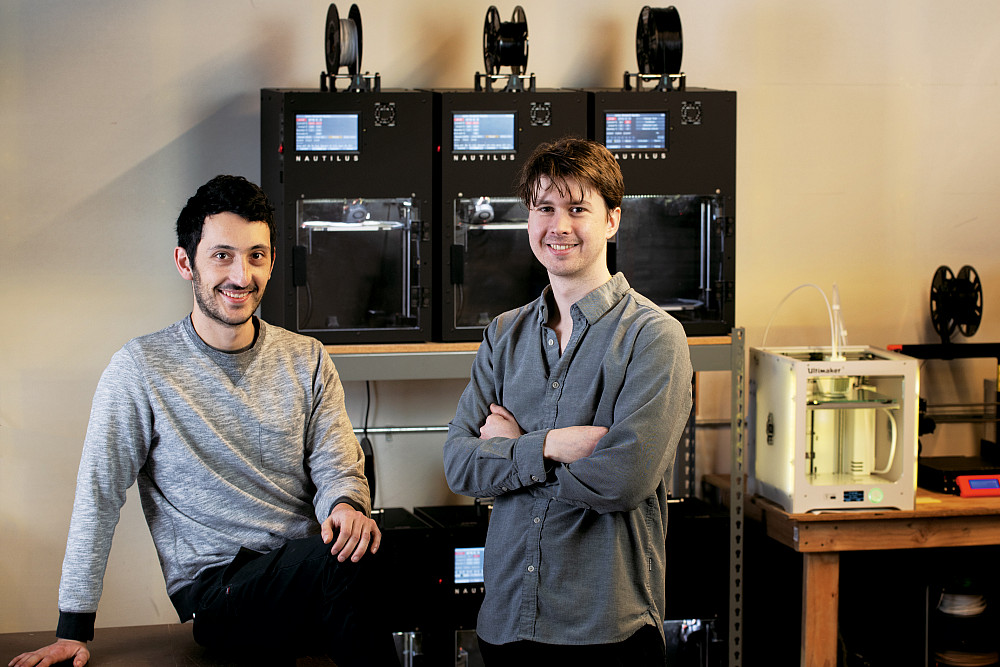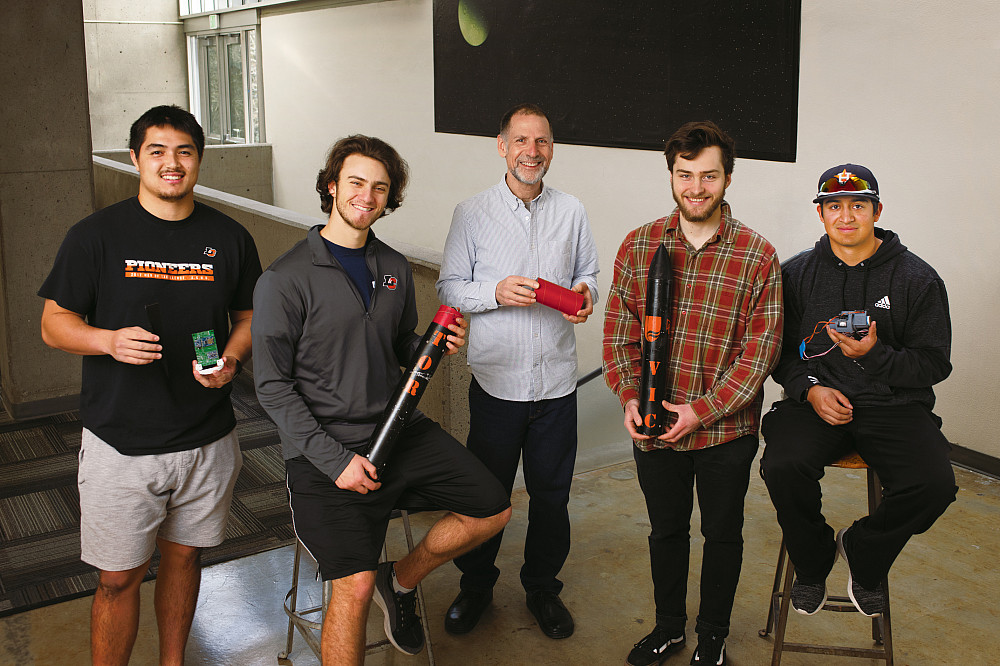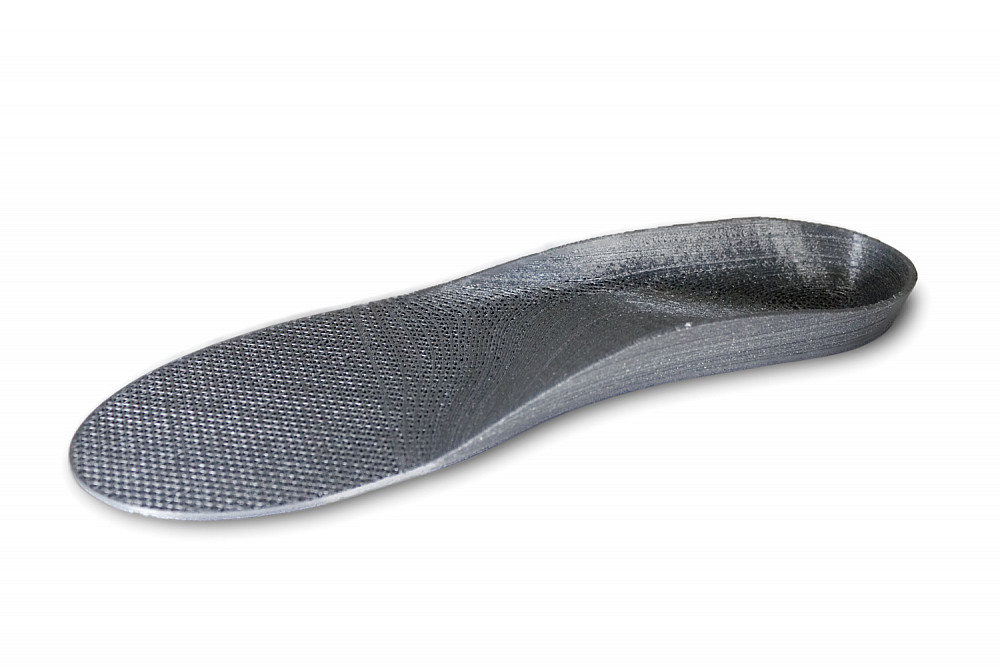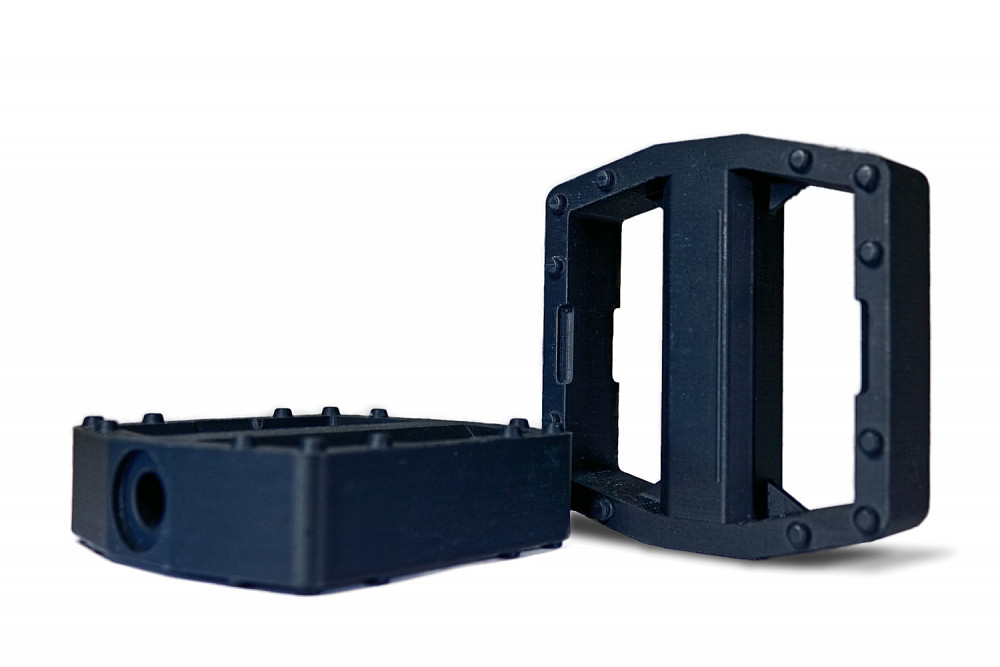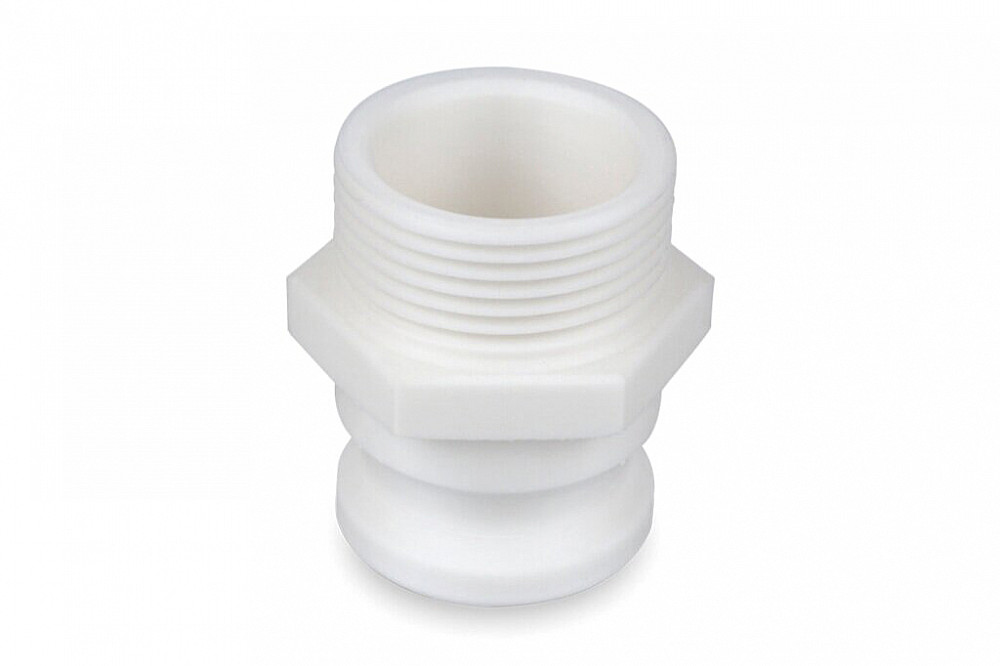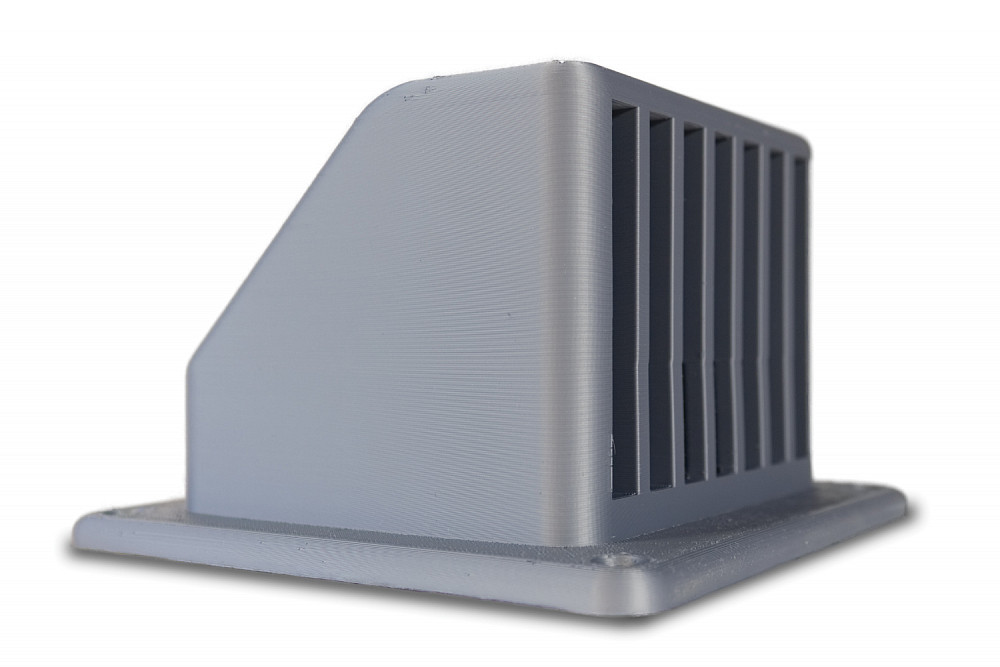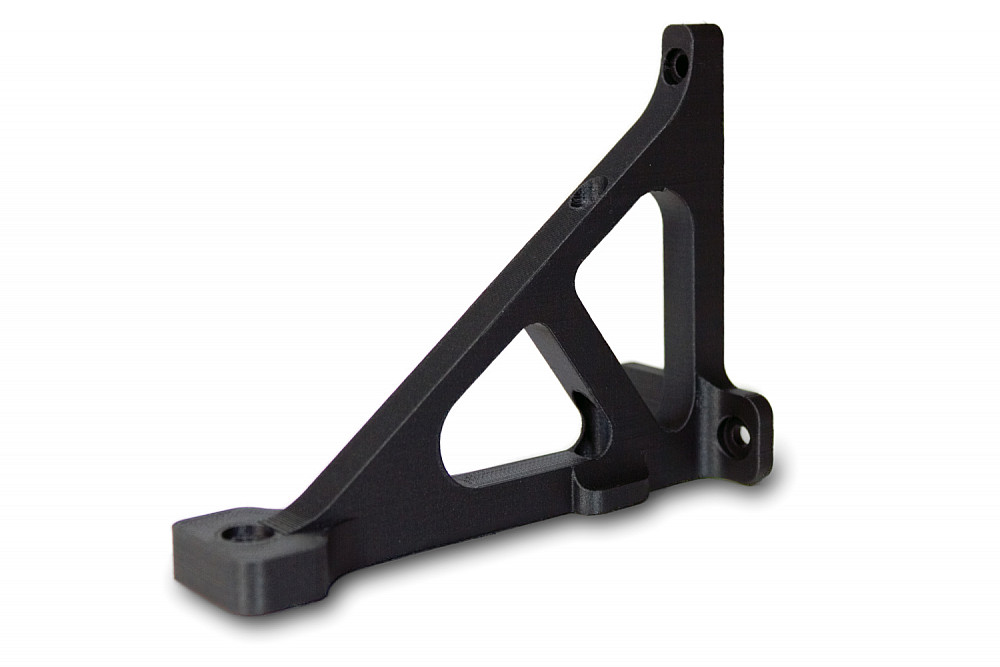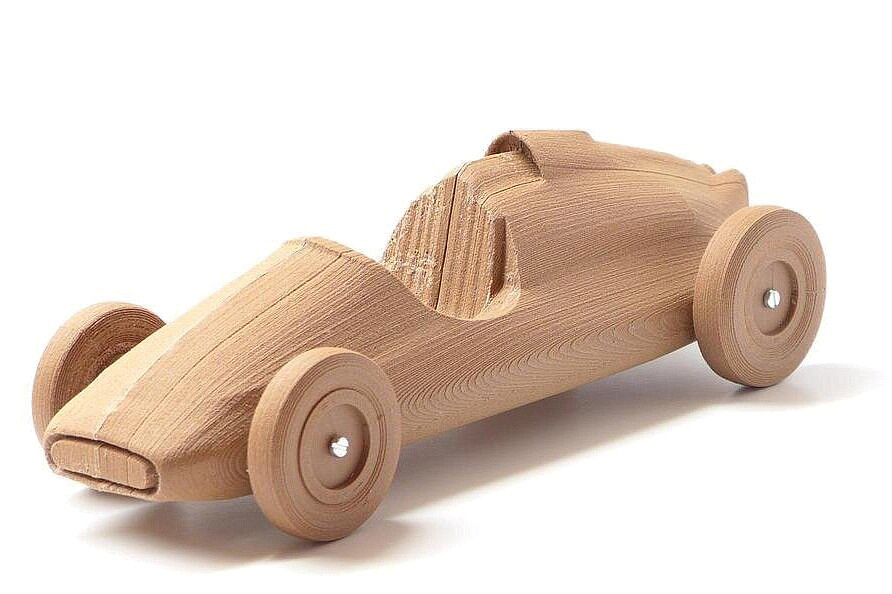main content New Dimensions in Business
L&C physics alumni cofound a growing 3D printer start-up.
by Romel Hernandez

As an aspiring inventor, John Kray BA ’17 found himself frustrated with the unreliability of 3D printers. So while studying physics at Lewis & Clark, he decided to build a better one.
“I just wanted to build a machine that worked,” Kray says matter-of-factly.
And what started out as a one-off project for an advanced lab class evolved into Hydra Research, a start-up business making an easy-to-use, dependable, and versatile 3D printer. Coming full circle, one of the company’s first sales was to the college’s physics department, where the current crop of majors is using the printer to build a rocket.
Hydra Research is a two-person, one-dog operation led by CEO Kray, CTO Zach Rose BA ’18, and office pet Sam. Together, they work out of a spartan workspace in Northeast Portland. The company’s signature product is the Nautilus, billed as a user-friendly yet high-quality desktop printer. Many of its key components are even made by the printer itself.
First invented in the 1980s, 3D printers make complex objects out of a range of materials for a wide array of applications, from machine parts to prosthetic limbs to toys. However, the printers can be tricky to use and vary widely in quality.
“I hate having to do a bunch of annoying tweaking and tuning,” Kray says, “I want a printer that’s able to print my part and get it right every single time. At least that’s the goal.”
Kray says he has been a hands-on learner since childhood and got interested in 3D printing during college. At Lewis & Clark he used the advanced physics lab—where students can pursue independent projects—to develop a prototype for a 3D printer.
“Honestly, I don’t think my professors had any idea what I was doing,” Kray says. “It was great!”
Associate Professor of Physics Michael Broide was one of the faculty supervisors of the class and says he quickly recognized that Kray brought a unique perspective to the work.
“In the lab, we always try to encourage students to explore their ideas and interests,” Broide says. “But John showed such amazing ability to problem-solve that we had to stand back and say, ‘Oh, what’s this?’ You don’t come across someone like John too often.”
After graduating, Kray was working as a barista and delivery person when he decided to try his hand at being an entrepreneur, working out of his bedroom. Eventually, he moved into office space and recruited fellow physics major Rose to join him.
“Like John, I’m not one for too much structure or the corporate 9-to-5 vibe,” Rose says. “We’re not in this for the glory. We’re in this because we love solving cool problems.”

When Hydra Research approached the physics faculty last year about buying one of their printers, which start at about $2,500, it turned out to be a pretty easy pitch. Soon after, a team of students made use of the department’s Nautilus printer to produce parts for a rocket, from its aerodynamic nose cone to a piston ejection system for its parachute. Having access to a fast, high-quality printer gave students flexibility to experiment.
“After printing one of the parts, we realized that altering a small aspect of its design would greatly improve its performance,” says Stephen Baker, a junior who worked on the rocket project “So we made a small modification to the part in our modeling software and printed it again. Within a couple hours, we had largely improved the design.”
The 3D printer market is growing fast, with experts estimating $15 billion in revenue this year and nearly $36 billion by 2025. Hydra Research is a small player but has worked with companies ranging from Keen Footwear to Mazama Wares.
The market is extremely competitive, with many companies going by the wayside, but Kray is optimistic. “At this price point,” he says, “nobody else can offer what we offer.”
As Kray and Rose look to grow their company, they have gotten a helping hand from Lewis & Clark. Through the Bates Center for Entrepreneurship and Leadership, they’ve been able to tap into a supportive business network (and hire a marketing intern, Otis King BA ’19). They also welcome interest from investors.
“A lot of this we’re trying to figure out as we go, and the Bates Center has been super helpful in terms of connections,” Kray says. “Overall, I think the flexibility of a liberal arts education is perfect for an entrepreneur, because you learn to be good at lots of things.”
Romel Hernandez is a Portland-based freelance writer.
Shielding Against COVID-19
When COVID-19 started to spread in the United States, Hydra Research stepped up to help fill the sudden nationwide shortage in protective face shields for medical professionals. The company shipped its first large order to New York at the beginning of April. Hydra’s website also includes the open-source design for its shield.
“This is work that just needs to be done right now,” Kray says. “If you can help, you should.”
Hydra Research is also accepting donations to purchase material to make additional shields it will donate to health and social service providers in Portland. For more information, visit www. hydraresearch3d.com/covid19-supplies.
-
 Zach Rose BA ’18 and John Kray BA ’17Credit: Copyright 2019
Zach Rose BA ’18 and John Kray BA ’17Credit: Copyright 2019 -
 3D printer users from the physics department: Mel Hoomanawanui BA ’20; Stephen Baker BA ’21; Michael Broide, associate professor of physics; Jake Peterfeso BA ’21; and Michael Contreras BA ’21.Credit: Copyright 2019
3D printer users from the physics department: Mel Hoomanawanui BA ’20; Stephen Baker BA ’21; Michael Broide, associate professor of physics; Jake Peterfeso BA ’21; and Michael Contreras BA ’21.Credit: Copyright 2019 -
 3D Printer example
3D Printer example -
 3D Printer example
3D Printer example -
 3D Printer example
3D Printer example -
 3D Printer example
3D Printer example -
 3D Printer example
3D Printer example -
 3D Printer example
3D Printer example
More L&C Magazine Stories
L&C Magazine is located in McAfee on the Undergraduate Campus.
MSC: 19
email magazine@lclark.edu
voice 503-768-7970
fax 503-768-7969
The L&C Magazine staff welcomes letters and emails from readers about topics covered in the magazine. Correspondence must include your name and location and may be edited.
L&C Magazine
Lewis & Clark
615 S. Palatine Hill Road
Portland OR 97219


